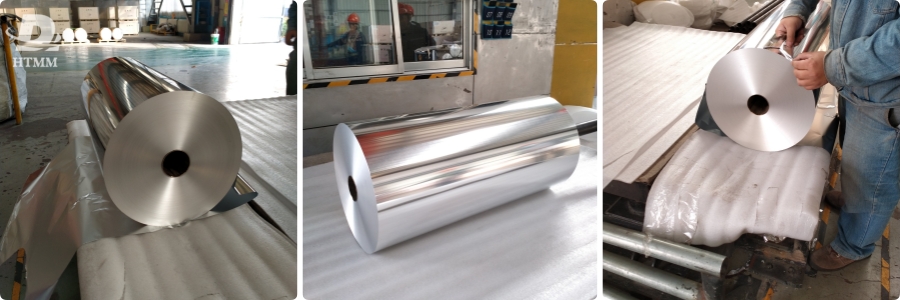Alloy 8011 contains up to 0.20% silicon as the primary alloying element. Small amounts of iron, copper, manganese, magnesium and chromium are also allowed. Alloy 8011's very strict purity specifications ensure that it contains no harmful or toxic elements that could leach into food.

In addition to the alloy, the physical properties and formability of aluminum foil also depend on its tempering state. Tempering is a heat treatment process that works to harden aluminum after rolling. Most household aluminum foil comes in the O (annealed) condition, which provides the best balance of softness, flexibility and strength for packaging and baking applications. The heat treatment process makes Alloy 8011-O highly non-reactive and corrosion-resistant.
food safety purity
Household aluminum foil intended for direct food contact must meet high purity benchmarks for Alloy 8011-O to receive regulatory approval and food grade certification. Major certification programs such as the FDA, EU and Health Canada have extensively reviewed the safety of 8011-O alloy and approved its use in food packaging applications.
Strict purity controls are built into the foil manufacturing process. 8011-O alloy is made from electrolytically refined aluminum and has a purity of over 99.85%. Alloying elements are carefully metered and monitored to keep elemental contaminants to an absolute minimum. State-of-the-art analytical techniques such as ICP-OES spectroscopy are used to verify that foil composition meets tight alloy specifications.
Additional measures such as in-line skimming further purify molten aluminum prior to casting and rolling. The controlled heat treatment process that achieves O-tempering also distributes elements evenly and stabilizes the aluminum matrix, locking impurities in place. Therefore, Alloy 8011-O foil will leach negligible elements even after long-term high-temperature food contact.
Packaging and baking applications
Due to its high purity, strength and flexibility, Alloy 8011-O is the material of choice for packaging and bakery applications. It's resistant to grease, moisture and heat, making it ideal for sealing meat, poultry, seafood and plant-based proteins during grilling, roasting and roasting.
Alloy 8011-O foil can withstand cooking temperatures up to 260°C/500°F without breaking down or imparting odors to food. This quality facilitates techniques such as en papillote cooking, where food is enclosed in foil packages and baked so that the flavors meld together and stay locked in. Its tight seal also prevents food from drying out during cooking.
For general food storage, 8011-O alloy foil is ideal for packaging cheese, leftovers, snacks, and more. Its firm yet soft texture conforms well to the shape of food while still maintaining a sealing barrier. Alloy 8011-O foil protects against moisture loss, oxidation and contamination, extending the shelf life of refrigerated or frozen perishable items.

Large roll convenience
While smaller aluminum foil rolls are convenient for basic kitchen tasks, larger aluminum foil rolls offer the advantage of being more cost-effective and easy to use. Jumbo foil rolls are made from the same high-purity alloy 8011 specifications and are ideal for packaging large cuts of meat, turkey or other proteins. Their extra-long continuous sheet minimizes waste from overlapping seams.
Food service operations harness the efficiency of giant aluminum foil rolls for batch cooking and food preparation tasks. They keep assembly lines running smoothly by eliminating the need to constantly switch rollers. Commercial and industrial bakers rely on the consistency of extra-large aluminum foil sheets to line baking sheets and trays. The extra strength works well for high-volume production needs.
For home bakers, larger rolls are more economical than smaller rolls when making multiple batches of cookies, crackers, or other baked goods. Their wider size completely covers a standard size pan with excess overhang. Frugal families also like to use large foil rolls to store food economically and neatly in the refrigerator or freezer. Even in busy households, large rolls last much longer than standard sizes.
Quality and safety standards
Major global certification providers such as UL, SGS and TUV extensively review alloy chemistry, production controls, packaging and facility sanitation protocols. Major markets such as the US, EU, China, India, etc. require aluminum foil to comply with PCI/DIN food contact standards or FDA 21 CFR regulations. Ongoing testing monitors regulatory and customer specifications for heavy metals, dross particles and restricted substances on Alloy 8011-O foils.
Alloy 8011-O is backed by the industry's strongest product warranties from leading manufacturers. Customers can be assured that 8011-O foil meets all current and foreseeable future regulatory requirements for purity and food safety. Extensive toxicological studies based on decades of safe use confirm that Alloy 8011-O does not pose safety risks or limitations in direct food contact applications when properly handled and used as directed.

Sustainable and recyclable
In addition to its excellent performance, aluminum foil made from 8011 alloy is also highly sustainable and environmentally friendly. Aluminum is infinitely recyclable without loss of quality – post-consumer aluminum foil can be recycled and molded into new aluminum foil, using 60% less energy than producing primary aluminum from bauxite ore. Recycling aluminum saves valuable resources and prevents large amounts of waste from ending up in landfill.
The aluminum industry has invested in closed-loop recycling programs to recycle household aluminum foil and increase recycling rates. Massive scrap aluminum foil collections divert thousands of tons of aluminum from the solid waste stream each year, stimulating demand for scrap aluminum. Recycled aluminum currently accounts for more than 75% of total aluminum foil production. When the aluminum foil finally reaches the end of its useful life, modern waste-to-energy plants extract the energy value from the burned aluminum scrap.
Due to the alloy's unique characteristics and strict purity controls, Alloy 8011-O has been the preeminent food-grade foil for decades. Its inherent advantages perfectly complement modern demands for food safety, health, sustainability and convenience. Whether wrapping leftovers or baking at high temperatures, confident home cooks and commercial operators trust 8011-O Alloy Foil to protect and enhance their culinary creations.

